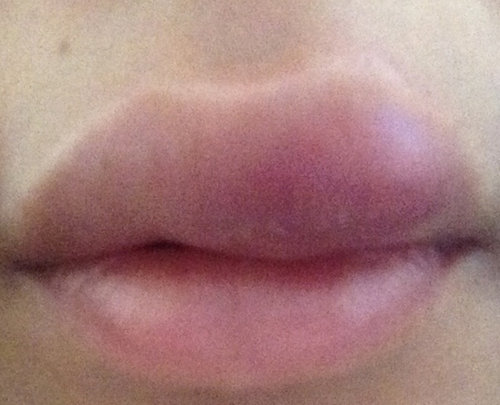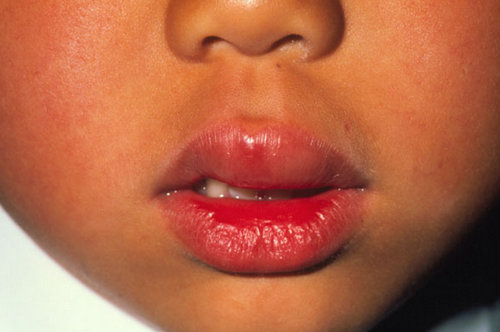Swollen Upper Lip
Do you notice that your upper lip swell upon waking up in the morning? Swelling of the upper lip is usually not harmful, but if the swelling gets severe and has been there for a long period of time, then it warrants immediate medical attention.
What are the common symptoms?
- Lip distention or enlargement of the upper lip
- A feeling of numbness on the upper lip
- There is a noticeable pain
- The upper lip feels tight and dry
- Itching and tingling feeling
- The lip appears chapped and with blister
- In severe cases, the patient experienced fever and chills (1, 2)

Image 1 : A woman suffering from upper lip swelling
Photo Source : www.askthedoctor.com

Figure 2 : A child with a noticeable swelling of the upper lip
Picture Source : s-media-cache-ak0.pinimg.com
Possible causes of upper lip swelling
- Injury and trauma to the upper lip – Your lip will swell if it is hit by a blunt object. Other activities that might cause trauma and injury to the upper lip include dental procedures, lip surgery, piercing on the upper lip, accidental biting of the lips, burning such as intake of hot food, kissing, playing musical instrument using the mouth, injury caused by dental braces, and botox.
- Allergic reaction – The upper lip may swell as a result of an allergy. It could be an allergic reaction to certain food groups, side effects of medications, use of lip care products, allergy to latex, and pet dander. Swelling of the lip secondary to allergy can be accompanied by other symptoms such as watery eyes, swelling of the face, and runny nose. It can happen to both children and adult. The swelling suddenly takes place, especially at night when you go to sleep. Upon waking up in the morning the following day, you noticed that there is something unusual in your lips.
- Angioedema – This is a condition characterized by swelling of the tissues beneath the skin, specifically in the areas of the lips and around the eyes.
- Infections – Various infections can lead to swelling of the upper lip such as herpes simplex virus infection, leading to the formation of blister or popularly known as cold sore. Inflammatory condition of the skin could also lead to swelling of the upper lip.
- Nutritional deficiency – If the upper lip swells, it is a telltale sign that your body lacks essential vitamins, especially vitamin B group. Aside from a swollen lip, vitamin B deficiency can also cause memory loss and abnormal changes in smell and taste. The body does not have the ability to produce vitamin B and so you have to get it from food sources and dietary supplement. Foods rich in vitamin B include dairy products, salmon, chicken, pork, and egg.
- Environmental factors – Various environmental conditions can cause swelling of the lips such as exposure to the extreme heat of the sun. It can cause chapping and drying out of the lips. It can also cause sunburn to the lips, which makes it appear swollen and inflamed. (3, 4, 5)
How to get rid of swollen upper lip at home?
Cold Compress
Applying a cold compress on the upper lip helps reduce swelling. Do not directly apply the ice on the lip. You have to wrap the ice in a cloth and gently place on the infected upper lip for a few minutes. Repeat when necessary, but make sure to take in between break to avoid irritation of the swollen lip.
Aloe Vera
The plant aloe vera is known for its healing properties. It is a good anti-inflammatory and is very effective in alleviating swelling and relieving burning sensation. It is very effective in alleviating swelling secondary to allergic reaction and insect bite. To use the aloe vera, just apply a fresh extract of the aloe vera on the affected lip, gently massage the lip, and repeat when necessary. (6)
Honey
Honey is known for its antibacterial property. Its healing property helps in alleviating pain and swelling. At the same time, it moisturizes the lips, reduce inflammation, and prevent further infection. To use the honey, just get a cotton ball and dip in a teaspoon of honey. Apply on the affected part of the lip and leave it there for about 30 minutes before rinsing. Do this two to three times a day.
Baking Soda
Create a baking soda paste to help reduce swelling and inflammation of the lip. To create your own baking soda paste, mix a spoon of baking soda and a teaspoon of water. Apply the baking soda paste on the affected lip and leave it there for a few minutes. Use cold water when rinsing and repeat when necessary. (7)
Medical approach/remedies
If you have tried the aforementioned remedies at home, but the swelling is still there and won’t go away, then it is time for you to ask help from a medical professional. There are various medical remedies for upper lip swelling and these include the following:
- Adrenaline injections – If the swelling of the lip is caused by an allergy, an adrenaline injection is commonly used. What it does is it counteracts the harmful effects produced by the immune system. However, not all people qualify for adrenaline injections. You have to discuss with your health care provider if you are suffering from other health problems. It is the doctor who will decide if you are going to receive adrenaline injections or not.
- Antihistamines – Drugs that belong to the antihistamine group can help relieve the symptoms of swollen upper lip. They are prescribed by doctors. The doctor usually prescribe oral antihistamine. However, if the symptoms are severe, the doctor could resort to other forms. In the case of anaphylaxis, an emergency treatment should be given to the patient as soon as possible.
- Anti-inflammatory drugs – Corticosteroids are quick when it comes to alleviating pain and swelling. There are over the counter corticosteroids and prescription drugs too. Prescription corticosteroids are tested and proven effective in the treatment of swelling of the upper lip. (8, 9, 10)
References:
- http://www.webmd.boots.com
- www.medicinenet.com
- www.wowremedies.com
- www.healcure.org
- health.knowfacts.org
- www.stylecraze.com
- www.medhealthdaily.com
- www.steadyhealth.com
- www.medscape.com
- www.stylecraze.com